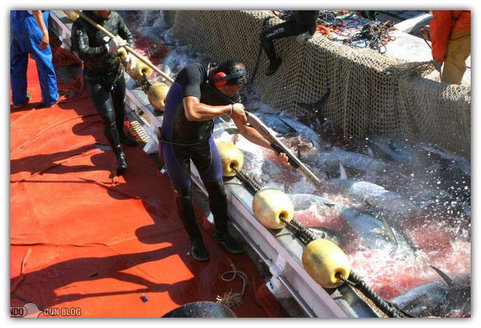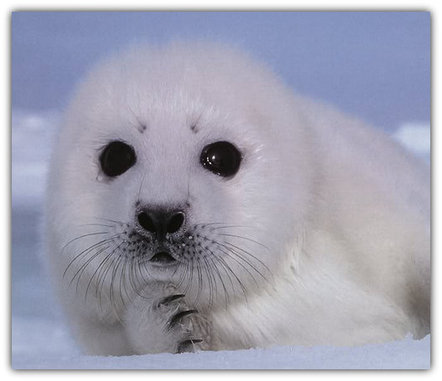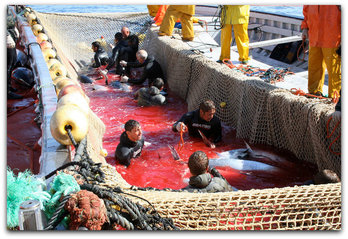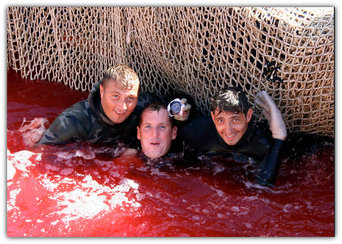"The (whale) gunners themselves admit that if whales could scream
the industry would stop, for nobody would be able to stand it."
-- BBC News Article
 by Moritz Siebert
by Moritz Siebert Every country has its traditions. Some are strange by today's standards. And some are fascinating, while others are abhorrent. So what what happens when an ancient traditional practice is now looked at as inhumane? Do we, as a society, intervene? Take for example, the ways marine animals are killed. Do we allow the inhumane slaughter of marine life to continue because it's part of tradition?
In Sicily, an island off the end of Italy, they have a centuries old tradition of killing tuna. The tonnarotti (tuna fisherman) first capture tuna in large nets and herd them to a holding bay. Some tuna will be harpooned and lifted ashore. Others are killed by spear yielding divers. And finally, others take aim with guns. I'd say this is coming as close as it gets to literally shooting fish in a barrel. Killing seems more for pleasure than for practical purposes, however, tuna are dying in record numbers to meet the nearly insatiable demand for their meat.
It's argued that stunning fish before bleeding them out is more 'humane' than shooting them. Shooting does not always instantly kill. With the fish flailing about, scared in the small, confined quarters, the shots penetrate another part of the poor creature’s body, only causing severe stress and painful injury before imminent death. Others argue, when done right, with a one kill shot to the head, it is more humane than spearing.
In Sicily, an island off the end of Italy, they have a centuries old tradition of killing tuna. The tonnarotti (tuna fisherman) first capture tuna in large nets and herd them to a holding bay. Some tuna will be harpooned and lifted ashore. Others are killed by spear yielding divers. And finally, others take aim with guns. I'd say this is coming as close as it gets to literally shooting fish in a barrel. Killing seems more for pleasure than for practical purposes, however, tuna are dying in record numbers to meet the nearly insatiable demand for their meat.
It's argued that stunning fish before bleeding them out is more 'humane' than shooting them. Shooting does not always instantly kill. With the fish flailing about, scared in the small, confined quarters, the shots penetrate another part of the poor creature’s body, only causing severe stress and painful injury before imminent death. Others argue, when done right, with a one kill shot to the head, it is more humane than spearing.

Baby seals are another target for these inhumane killings. Hunters go after them for their soft white coat. Their methods to kill the animal are similar to those with the fish; stun the animal with a blow to the head before bleeding them. This is considered the humane way to go about hunting seals. Unfortunately, hunters are not always that accurate. Seals are hit multiple times, causing them great pain. Some hunters will try to go after more than one seal at once, often causing the blows to be inaccurate and painful.
Many people have heard about the Japanese whaling industry, partly because of the enormous, if not atrocious, numbers of whales that are being slaughtered. Whaling is still being conducted in Japan for what they claim to be scientific research. Is this research worth it though when it takes some whales up to an hour to finally die? Some can even continue to live after being painfully harpooned. An article from BBC News admitted, "The gunners themselves admit that if whales could scream the industry would stop, for nobody would be able to stand it."
Some would say there are humane methods for killing animals. Certainly, there are less painful ways for animals to be killed. But what is the definition of humane? What makes a kill humane? The method? The number that die? The reasons for killing?
The answers to those questions will be explored in future articles. Until then, I leave you to think about this. Whether killing is done in the name of tradition, industry, or science, shouldn't we always consider the animal’s suffering above all else in the process?
The answers to those questions will be explored in future articles. Until then, I leave you to think about this. Whether killing is done in the name of tradition, industry, or science, shouldn't we always consider the animal’s suffering above all else in the process?
Sources:
http://moldychum.typepad.com/moldy_chum/2007/07/in-may-and-june.html
http://kb.rspca.org.au/What-is-the-most-humane-way-to-kill-a-fish-intended-for-eating_451.html
http://www.harpseals.org/about_the_hunt/index.php
http://t.thestar.com/#/article/news/canada/2012/11/09/canadian_seal_hunt_is_humane_study_argues.html
http://news.nationalgeographic.com/news/2014/09/140918-japan-scientific-whale-hunt-animals-ocean-science/
http://news.bbc.co.uk/2/hi/science/nature/3542987.stm
http://www.bestofsicily.com/mag/art125.htm
http://moldychum.typepad.com/moldy_chum/2007/07/in-may-and-june.html
http://kb.rspca.org.au/What-is-the-most-humane-way-to-kill-a-fish-intended-for-eating_451.html
http://www.harpseals.org/about_the_hunt/index.php
http://t.thestar.com/#/article/news/canada/2012/11/09/canadian_seal_hunt_is_humane_study_argues.html
http://news.nationalgeographic.com/news/2014/09/140918-japan-scientific-whale-hunt-animals-ocean-science/
http://news.bbc.co.uk/2/hi/science/nature/3542987.stm
http://www.bestofsicily.com/mag/art125.htm



 RSS Feed
RSS Feed
